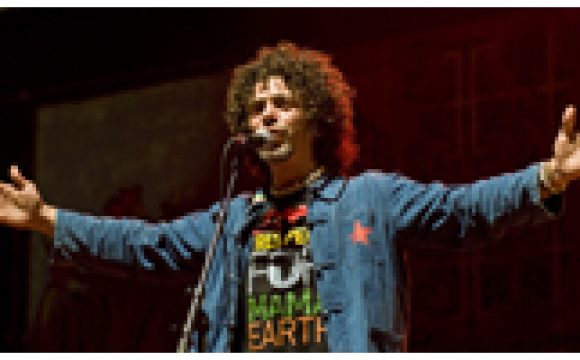
At the Festival Gnaoua et Musiques du Monde; Essaouira, Morocco, 2010
©Alice Mutasa 2010
Algerian musician Amazigh Kateb’s ground-breaking band Gnawa Diffusion blazed a trail across North Africa and France for over 15 years, with their highly original blend of Gnaoua, reggae, rap, funk, punk and traditional North African sounds, complemented by Amazigh’s charismatic stage presence and witty, intelligently crafted and politically astute lyrics. With his fierce sense of justice and unflinching criticism of the post-colonial legacy in Africa, globalisation, US foreign policy, the situation in Palestine and the current Algerian government, Amazigh’s themes resonated with a generation of young North Africans. His first solo album, the excellent ‘Marchez Noir’, released in 2009, develops both his musical and ideological paths, and includes musical arrangements of two poems by his late father, the celebrated writer Kateb Yacine.
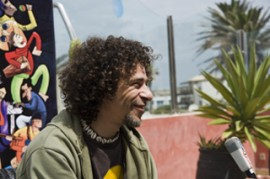 With his mop of unruly curls and a wicked smile that fills his whole face with laughter lines, Amazigh Kateb managed to charm all of the journalists at the Festival Gnaoua, with his good humour, intelligent, thoughtful responses and infinite patience even when answering the same questions several times over….. After commiserating with him over the fate of the Algerian team in the world cup, I asked him about his travels in Cuba and his ideas of ‘Africanite’….
With his mop of unruly curls and a wicked smile that fills his whole face with laughter lines, Amazigh Kateb managed to charm all of the journalists at the Festival Gnaoua, with his good humour, intelligent, thoughtful responses and infinite patience even when answering the same questions several times over….. After commiserating with him over the fate of the Algerian team in the world cup, I asked him about his travels in Cuba and his ideas of ‘Africanite’….
This interview was conducted in French; please see below for the English translation.
Vous avez parle de la chanson ‘Africain’ (sur ‘Marchez Noir’) comme votre ‘propre vision de l’Africanite’ ; est-ce que vous croyez que dans un continent aussi enorme et divers, une ‘identite Africain’ peut vraiment exister, ou c’est quelque chose de personnel ?
Je pense que ce n’est pas personnel, parce que sinon il n’y aurait pas tout ce public qui se reconnaitrait dans ce message-là – et je ne parle que de mon public – il y a d’autres artistes qui travaille autour de l’africanite, au Mahgreb par exemple, et puis il y a plus en plus de gens qui sont concerne par cette Africanite, après je pense qu’il y a un denominateur commun par rapport à l’histoire – c’est l’histoire de l’esclavage, de la colonisation – malheureusement ce sont des elements negatifs, mais souvent les pays et les peuples qui ont ete domine, colonise, ils ont repris les elements du colon, les elements du dominateur…. pour refaire leur pays. Donc on est en train de construire une nouvelle Afrique, et on est loin d’avoir fini, parce qu’on est encore dans la geographie coloniale… et dans les guerres qui n’appartiennent pas à l’histoire de l’Afrique– ce sont des guerres qui ont ete importe par la colonisation, des tensions qui ont ete cree par les frontières coloniales…..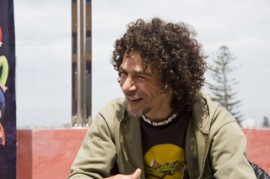
Donc, aujourd’hui, si on veut recreer une Africanite, je pense qu’il faut aller vraiment chercher l‘essence de cette Africanite, et pour l’instant l’essence de cette Africanite est comme dans le texte de ‘Africain’ : ‘Autant de fois que le soleil decline, et nous oblige a faire feu’, ça veut dire qu’aujourd’hui, sur l’Afrique, tous les jours le soleil se couche, tous les jours on risque de tomber dans l’obscure, et tous les jours il faut soigner le feu – il faut en prend soin – et ces souffles-là feront l’Afrique de demain, c’est surement pas les lumières du spot publicitaire, et tout ce qui est en train de transformer l’Afrique en quelque chose de standard, en quelque chose de mondialise… Voilà je pense qu’on a en tous cas un interêt à sauver notre identite, notre culture, parce que l’economie à mon avis c’est perdu; ça fait longtemps que l’economie nous a echappe…. Donc les rares choses qu’on ne peut pas voler dans la vie, c’est ton honneur, c’est ce que tu as dans le coeur, c’est ta culture, c’est les odeurs de ta maman….
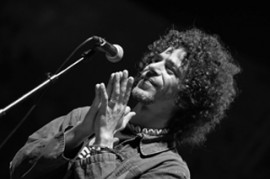 Qu-est qu’il faut a votre avis pour que les pays colonises puissent surmonter la colonisation?
Qu-est qu’il faut a votre avis pour que les pays colonises puissent surmonter la colonisation?
Je pense qu’ils devraient arrêter de se vendre au pays Occidentaux, qu’ils devraient arrêter l’obedience, que les richesses des pays restent la propriete des etats, et non pas la propriete des prives, parce qu’il y a certains pays d’Afrique où même l’eau est privatise. L’Afrique est un continent où l’economie des pays est complètement epuise ; par exemple l’Algerie – le FLN ….. a negocie des accords d’Evian avec la France en ‘61; il y avait des contrats sur le main-d’œuvre immigre…. pour envoyer les Algeriens travailler en France, mais…. c’etait très mal gere, et finalement on a l’immigration ghetto, dortoir etc. Dans les accords d’Evian les français sont partis avec les contrats pour le gaz par exemple; pour le petrole, donc toutes les richesses ont ete tout de suite brade, …. et on s’est retrouve a construire un pays dans des frontières qu’on n’as pas decide, et avec un infrastructure herite d’un système coloniale qu’on a combattu pendant des annees…
Donc c’est aux Africains de changer la situation ou aux gouvernements occidentaux ?
Je pense que c’est au peuple…. de se reveiller, de faire la revolution… je souhaite pour l’Afrique quelque chose qui ressemble à une vrai conscience… peut-être quelque chose qui va commencer dans un pays puis dans un autre pays, et qui prenne tout le continent…. Je le souhaite parce que je pense que dans l’histoire de l’humanite la revolution est comme un vaccine qui marche pendant quelques annees et après il faut faire un rappel; et là je pense qu’on a bientôt besoin d’un rappel sinon on va tous tomber malade….
Vous avez dit que vous avez ete très impressionne par vos voyages à Cuba et le système là-bas; est-ce que vous croyez que le Cuba peut s’approcher un peu du capitalisme mais sans perdre la justice sociale et les avantages qu’ils ont obtenu là-bas ?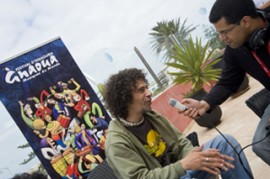
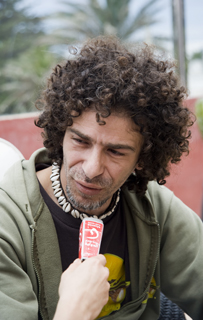 S’ils suivent une route comme par exemple au pays du Maghreb, un vrai capitalisme sauvage, c’est mal barre pour les acquis sociaux et pour tous les acquis de la revolution Cubaine, mais ce que j’ai vu, c’est que le tourisme est une economie, qui rapporte à cet etat, mais qui n’est pas en train de pervertir le pays, qui n’est pas en train de changer l’aspect du pays, ou des gens…. Il y a un truc qui est très intelligent à Cuba, c’est qu’il y a deux monnaies; il y a une monnaie pour les etrangers – pour ceux qui ont un niveaux de vie plus eleve – et une monnaie pour les Cubains; et je trouve que c’est un très bonne chose pour etablir un peu une justice sociale en termes de pouvoir d’achats…
S’ils suivent une route comme par exemple au pays du Maghreb, un vrai capitalisme sauvage, c’est mal barre pour les acquis sociaux et pour tous les acquis de la revolution Cubaine, mais ce que j’ai vu, c’est que le tourisme est une economie, qui rapporte à cet etat, mais qui n’est pas en train de pervertir le pays, qui n’est pas en train de changer l’aspect du pays, ou des gens…. Il y a un truc qui est très intelligent à Cuba, c’est qu’il y a deux monnaies; il y a une monnaie pour les etrangers – pour ceux qui ont un niveaux de vie plus eleve – et une monnaie pour les Cubains; et je trouve que c’est un très bonne chose pour etablir un peu une justice sociale en termes de pouvoir d’achats…
Après je pense qu’il n’y a pas de gouvernance parfaite, et je crois qu’il n’y a quelque chose de plus difficile que gouverner, et ce que je trouve très sain chez les Cubains c’est qu’ils veulent du changement, ils veulent les choses nouvelles dans leurs vies, mais ils ne renient pas la revolution Cubaine ; ils renient pas la position de Cuba; le fait que Cuba est sous embargo depuis pratiquement 50 ans, est que c’est cette embargo qui a fait de cette île une île dites ‘pauvre’, mais personnellement je trouve que Cuba est un pays exemplaire en termes de droits de l’homme, par exemple; à Cuba je n’ai pas vu les SDF dehors – en France j’en vois tous les jours – à Cuba tout le monde mange ; même si ils ne mangent pas la grande variete – ce n’est pas la gastronomie française – mais tu a à manger. Les gens sont soignes gratuitement; j’ai vu les vieux qui n’avaient plus de dents; qui ne voyaient plus rien – eh hop, ils ressortent tout neufs… Voilà, je pense que les ‘petits’ pays ont des leçons à donner au ‘grands’ pays…..
**********************************************************************************************************************
ENGLISH VERSION :
You have described the song ‘Africain’ (on ‘Marchez Noir’) as expressing your ‘own vision of ‘Africanness’ (‘Africanite’). Do you think that in such a vast and diverse continent, an ‘African identity’ can really exist, or is this something personal to you ?
I don’t think it’s personal; if it was there wouldn’t be so many people who recognise themselves in that song – and I don’t mean only my own audience – there are other artists who work with the theme of ‘Africanite’, in North Africa for example, and I think there are more and more people who are concerned with this idea of ‘Africanite’… African nations have a common denominator in terms of our history – it’s a history of slavery, colonialism – unfortunately these are negative elements, but often countries and people who have been dominated, colonised, have taken elements from the coloniser to re-invent their country… We are in the process of constructing a ‘new Africa’, although we’re far from achieving this goal, because we still live within the colonial geography; we’re still in the middle of wars which aren’t really historically African, but which were imported by colonialism, by the tensions created by colonial frontiers….
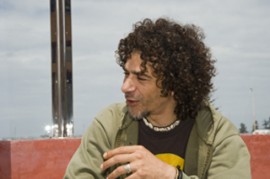 Today, if we want to really create a new ‘African identity’, we have to really search for the essence of this ‘Africanite’; like in the text of ‘Africain’ – ‘every day when the sun sets we have to create fire’ – we risk being plunged into darkness, and every day we have to nurture this fire; and it is these breaths that will become the Africa of tomorrow – certainly not globalisation, that threatens to turn Africa into something ‘standardised’…. In any case we have an interest in maintaining our culture, our identity, because in my view the economy is lost; it’s been a long time since our economies have been outside our control …. and some of the few things that cannot be stolen from you are your honour, your culture, what you have in your heart….
Today, if we want to really create a new ‘African identity’, we have to really search for the essence of this ‘Africanite’; like in the text of ‘Africain’ – ‘every day when the sun sets we have to create fire’ – we risk being plunged into darkness, and every day we have to nurture this fire; and it is these breaths that will become the Africa of tomorrow – certainly not globalisation, that threatens to turn Africa into something ‘standardised’…. In any case we have an interest in maintaining our culture, our identity, because in my view the economy is lost; it’s been a long time since our economies have been outside our control …. and some of the few things that cannot be stolen from you are your honour, your culture, what you have in your heart….
What do you think is necessary for countries that have been colonised to overcome the impact of colonisation?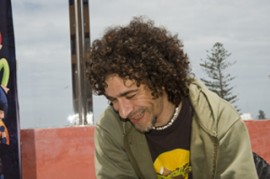
I think they have to stop selling themselves to western countries; they have to stop being obedient; the riches of the countries should remain the property of the state, and not private property – because there are some African countries where even the water is privatised….. In many African countries the economy is completely exhausted… For example Algeria – under the ‘Evian Accord’; the agreement made in 1961 between the FLN* and France…. the contracts for immigration – for Algerians to go and work in France – were very badly organised, and now you have immigration ‘ghettos’….. The French left Algeria with all of the contracts for gas, petrol etc; very quickly all the riches of the country were sold off…. And we found ourselves trying to construct a country within boundaries that we didn’t choose, and within an infrastructure inherited from a colonial system that we’d been fighting against for years….
*FLN = ‘Front de Liberation Nationale’ – the main revolutionary body that directed the Algerian war of independence against France.
Is it within the hands of Africans themselves to change the situation, or western governments?
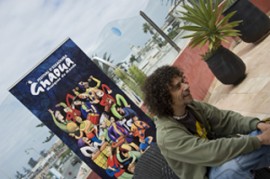 I think it’s up to the people to wake up; to create a revolution; I hope for Africa that there will be something like a real awakening; perhaps something that starts in one country, then another, and which takes hold of the whole continent… I think throughout history revolutions have been like vaccines; they work for a few years but then you need a booster… & I think we need a booster soon otherwise we’re all going to fall ill….
I think it’s up to the people to wake up; to create a revolution; I hope for Africa that there will be something like a real awakening; perhaps something that starts in one country, then another, and which takes hold of the whole continent… I think throughout history revolutions have been like vaccines; they work for a few years but then you need a booster… & I think we need a booster soon otherwise we’re all going to fall ill….
You’ve spoken about being very impressed by your visit to Cuba; do you think it’s possible for Cuba to move some way towards capitalism, but without losing the social justice, the gains they have created?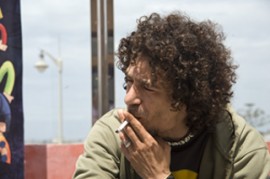
I think if they move towards a ‘crude’ capitalism it would be bad for the social gains of the Cuban revolution, but there are things there such as tourism, which brings money into the country but which isn’t in the process of perverting the country, of changing people….. I also found the dual currency there very intelligent; there’s a currency for tourists – for those who expect a higher standard of living – and a currency for the Cubans, which establishes a form of social justice in terms of buying power….
But I think there is no perfect system of governance; and there is nothing more difficult than governing a country, and what I found very healthy in Cuba was that while the Cubans want change, they want new things in their lives, they don’t turn their backs on their revolution, or on Cuba’s position… the fact that Cuba has been under an embargo for practically 50 years, which has made them into a so-called ‘poor’ island’ yet personally I found Cuba to be exemplary in terms of human rights; for example, I saw no homeless people in Cuba, yet in France I see them all the time. In Cuba everyone has enough to eat – maybe not a great variety of food – not French gastronomy – but they eat. People receive free healthcare; I saw old people with no teeth; who could no longer see; they get treated and come out like new again…. I think that sometimes the ‘little’ countries have lessons to teach the ‘big’ countries…..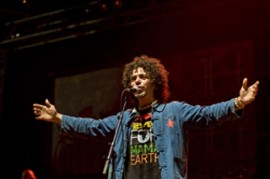
Alice Mutasa, Essaouira, 26 June 2010
Amazigh Kateb’s website: http://www.marcheznoir.amazighkateb.com/
